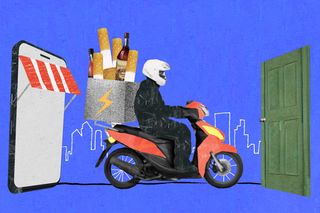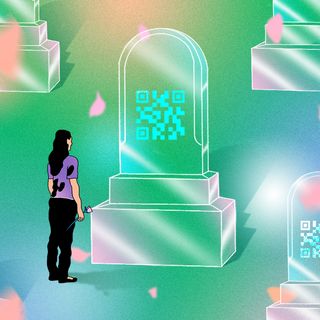
Round‑the‑Clock Food, Smoke Delivery Services Are Sustaining the Great Urban Sleeplessness
The accessibility of the delivery services reinforces a culture that values instant gratification over long-term wellbeing.

“Some people have trouble falling asleep. But others choose to stay awake and end up chronically sleep deprived,” says Dr. Sogol Javaheri, a sleep specialist at Harvard-affiliated Brigham and Women’s Hospital. “These people could sleep more if they let themselves, but they don’t make it a priority.”
In the modern age of unprecedented convenience, delivery apps like Swiggy, Zomato, and Dunzo — which help people cater to most of their late-night whims and cravings — are, perhaps inadvertently, sustaining the great urban sleeplessness. Food, cigarettes, groceries, and even mixers for alcohol are all just a few taps away — around the clock, every day. “The ease of getting food delivered [at night] has made it harder for old habits to die,” says Nishi, 27, who struggled to fix her sleep schedule for years. “I end up sleeping late, and the next day, I’m just struggling to get through because I’m zoned out, and really want to go back to sleep.”
The accessibility of these delivery services reinforces a culture that values instant gratification over long-term wellbeing, and establishing healthy schedules. This isn’t to say that the pursuit of instant gratification, per se, is conspiring against the precious shut-eye; but by making the means to fuel our late-night contemplations more accessible than ever before, they are complicit in the deprioritization of sleep among the urban elite.
This is particularly concerning since sleep deprivation is also on the rise — among adults and adolescents alike — due to a host of reasons, including more screen time, disappearing boundaries between personal and professional lives, and increased stress and anxiety among people. Citing data that suggests 62% of adults, globally, don’t get enough sleep, the World Economic Forum noted, “The world is not getting enough sleep… Sleep is one of the most important aspects of our health; it’s also one of the easiest to neglect.” In India, matters are, perhaps, worse; a 2019 research spanning 18 countries found Indians to be the second-most sleep-deprived people in the world.
Related on The Swaddle:
Delivery apps aren’t the root cause of this sleeplessness, though. “[O]ften, I struggle to get off my phone, either binge-watching things or scrolling mindlessly through social media,” Nishi explains. Social media brings with it incessant advertisements, including that of food delivery apps with their warm color palettes that are meant to trick people into feeling hungry by raising their heart rates.
“[Y]ou have an attention-seeking machine in your pocket that is designed to distract you and monopolize your gaze. Since every second that you are working, sleeping, or socializing, translates into potential lost revenue for someone, billions are spent devising novel ways to grab your attention and keep you engaged,” writes Samoon Ahmad, a clinical professor of psychiatry at the NYU Grossman School of Medicine, explaining how we have “become susceptible to sophisticated technologies meant to hijack your attention.” In a sense, then, both social media and round-the-clock delivery services work hand in hand to benefit from the sleep epidemic. They exploit our lack of self-control — often instrumental in keeping us awake even though we should be long asleep — to churn profits by pushing us deeper down our social media feeds as we attempt to distract ourselves while waiting for the food we just ordered.
Past research has shown a link between sleep deprivation and impaired impulse control, too. Sleep deprivation affects the prefrontal cortex, the region of the brain responsible for decision-making and impulse control. So, when individuals are sleep-deprived, they are more likely to make impulsive choices — thus reinforcing the cycle of staying up late and indulging in unnecessary purchases.
Round-the-clock delivery services also feed urban sleeplessness by supporting the modern hustle culture. Overworking is rewarded and glorified to the point, “where we are competitive about how little we sleep,” noted Saumya Kalia in The Swaddle. “The lack of sleep ties neatly with the Indian myth of hard work: that people can choose to be successful, if only they suffer sufficiently for it.” And, of course, it is easier to persuade employees to pull all-nighters at work when they can’t complain about having to go hungry, courtesy of these apps. In fact, I’ve worked at law firms – notorious for their abject lack of work-life balance – that would incentivize people to work ungodly hours and meet unrealistic deadlines by offering to compensate them for their late-night orders.
Related on The Swaddle:
However, eating late at night can not only cause acid reflux and the discomfort that follows but also adversely affect blood sugar, blood pressure, and weight. In addition, the sleep deprivation that late-night snacking habits can foster also has grave implications for people’s health — from an increased risk of obesity, cardiovascular disease, and mental health disorders like depression and anxiety to disruption of the body’s natural circadian rhythm, leading to chronic fatigue, decreased cognitive function, and reduced productivity. Experts also point out that if we eat late, our bodies are less prepared to fall asleep any time soon. Staying up for too long, however, can lead one to feel hungry again — thus spawning a vicious cycle.
In this cycle, round-the-clock delivery services play the part of an enabler by aiding and abetting sleep deprivation in a capitalist society where leisure is a luxury, and where many people fall prey to revenge bedtime procrastination — simply to afford some “me” time that their responsibilities don’t permit them during the day.
Interestingly, the same capitalist mindset of treating personal time as an extravagance and endorsing a culture of work-till-you-drop thus also stands to benefit from impulsive late-night orders while exploiting their overworked, underpaid delivery executives. So, while round-the-clock delivery services are, undoubtedly, a boon to many, it is also pertinent to acknowledge their role — not to mention their profit margin — in sustaining the great urban sleeplessness.
Devrupa Rakshit is an Associate Editor at The Swaddle. She is a lawyer by education, a poet by accident, a painter by shaukh, and autistic by birth. You can find her on Instagram @devruparakshit.
Related


From ‘Smart Graveyards’ to Griefbots, Is Digital Immortality the Future of Death?
